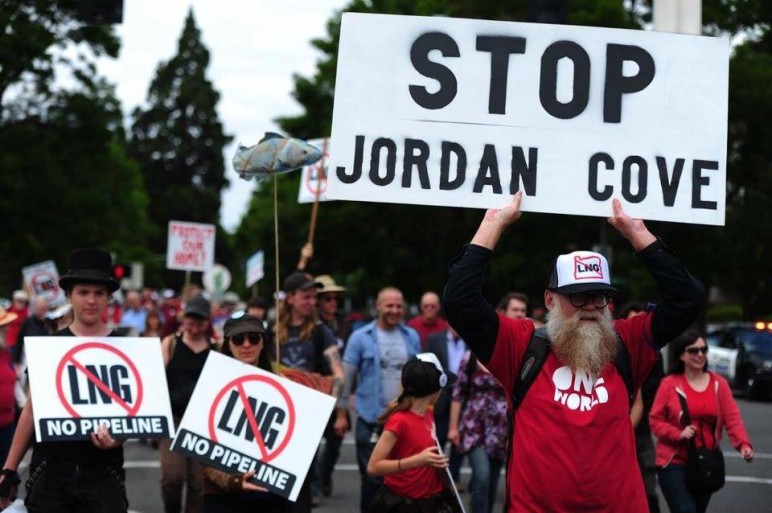
As most of you know all too well, the Sierra Club has long been working with our allies in Oregon and across the country to fight the Jordan Cove LNG terminal and Pacific Connector pipeline. Here's a quick refresher for those of you new to the issue, as well as an update on what's going on at the moment.
The quick scoop: A Canadian company, Pembina, wants to build the Jordan Cove Energy Project to export fracked liquefied natural gas (LNG) from Canada and the Rockies through southern Oregon to Coos Bay and then to Asia. This would require a 229-mile Pacific Connector Pipeline across private and public land, creating a 95-foot wide clearcut through southwest Oregon's forests, farms, and rivers.
The pipeline would terminate in an export facility on the North Spit in the Port of Coos Bay. The facility would be located in the tsunami hazard zone, subjecting over 16,000 people to hazardous burns in the case of an accident. This project would endanger pollute 400 waterways (including the Rogue and Umpqua Rivers), harm salmon, impact hundreds of landowners, threaten tribal territories and burial grounds, raise energy prices, and create the largest source of climate pollution Oregon has ever seen. Clearly, it is a project that needs to be stopped.
Permit updates: In order to build the terminal and pipeline, Jordan Cove must obtain dozens of permits from federal, state, and local authorities. The denial of any of these permits could keep the project from moving forward, so each one is important in its own way. But there are only so many hours in the day and only so many permits we can track in detail here at the Sierra Club. Here's a quick summary of what's going on with some of the highest-profile permits.
- Oregon Department of Land Conservation and Development (DLCD): The most recent permit up for consideration was Jordan Cove's request to DLCD to have the project be certified as being in compliance with the Coastal Zone Management Act (CZMA). We of course believe that there's no way this behemoth of a facility could be constructed and operated without having major impacts to the coastal ecology of the Coos Bay area. In addition to submitting formal comments in conjunction with our allies and national Sierra Club's Environmental Law Program, we sought public comments into DLCD asking them to deny the CZMA certification. Thanks to the many of you who joined the nearly 25,000 people who submitted comments to the agency before its September 21 deadline. DLCD was originally supposed to be making a decision on the matter in October, but they have apparently received a request from Jordan Cove to stay that decision until January 2020. DLCD has not officially granted that stay yet, but we expect that they will do so.
- Oregon Department of State Lands (DSL): Similarly, a decision was expected in late September by DSL on Jordan Cove's removal-fill permit for the LNG terminal and the pipeline. Many of you were among the thousands of citizens who turned out for hearings in Salem and in southern Oregon earlier this year and spoke forcefully against the granting of the permit. Or maybe you were one of the more than 40,000 people who submitted comments to DSL on that permit. Due in part to the large volume of input the agency received, earlier this year DSL had moved back its decision date to September 20. Then on September 13, DSL approved a request from Jordan Cove that it extend its decision date out to January 2020. Assuming Jordan Cove gets some additionally-requested material in to DSL in October, the earliest we'll see a decision from that agency is next January.
- Oregon Department of Environmental Quality (DEQ): In May of this year, we were extremely pleased when DEQ denied Jordan Cove's application for a Section 401 permit under the Clean Water Act. We and our partners mobilized tens of thousands of you last year to get comments in to DEQ and to a simultaneous permit process happening then with the Army Corps of Engineers. DEQ shared some of the concerns we raised in those comments and determined Jordan Cove had not adequately shown the project could comply with the Clean Water Act and thus denied the permit in May. However, because they denied it "without prejudice," Jordan Cove is free to amend its permit application and re-apply to DEQ. We expect that they will indeed do so later this year or early in 2020.
- Federal Energy Regulatory Commission (FERC): In addition to all of the state permits mentioned above, Jordan Cove must also receive authorization for the project from FERC. Given the composition of FERC under President Trump, we were not surprised when the commission issued a very weak Draft Environmental Impact Statement (DEIS) in March of this year. Despite finding that the project would indeed have substantial impacts on the environment, they concluded those impacts could be mitigated or minimized, and that the project could proceed. We again worked with our allies to both get formal comments into FERC objecting to the DEIS, and to get more than 30,000 public comments in as well. Unfortunately, we're not necessarily optimistic that FERC will address our objections when they issue the Final Environmental Impact Statement later this year or early next year.
So the fun never ends with the Jordan Cove and Pacific Connector Pipeline project. Stay tuned for further updates as they become available. We at the Sierra Club are determined that this will be the time we put an end to "Oregon's Standing Rock" once and for all.